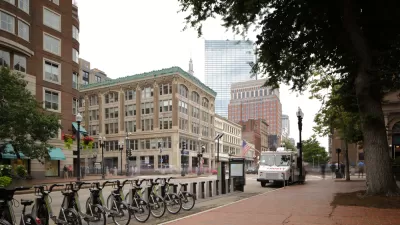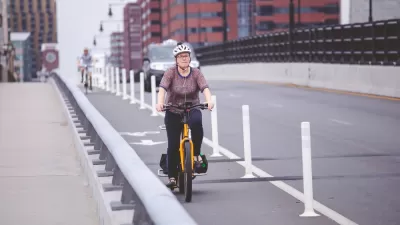Bikeshare programs have met varied degrees of success in North America. Boston’s Hubway, the result of a public-private partnership, is turning a profit entering its fourth year. What's its secret?
Martine Powers reports for the Boston Globe on the success of Hubway, the city of Boston’s bikeshare system. After shutting down for the winter, “Hubway opened for its fourth season with a rosy financial prognosis, a fresh contract between the City of Boston and bike-share operators, an expectation that the system will continue turning a profit, and plans for 10 new stations.”
Powers contrasts the experience of bikeshare programs in Montreal and New York City, both of which have encountered financial trouble in 2014.
The success of bikeshares programs like Boston’s might lie in its modest and incremental goals. To make this point, Powers quotes Mia Birk, Hubway Bike Share vice president: “Bike share systems in Boston, Denver, Chicago, Minneapolis, and Washington, D.C., all of which started relatively small and relied on public sector funds, were able to launch with success, iron out kinks, stabilize, and expand quickly.”
A few more details on the funding and operating structure of Hubway: “Previously Boston divided the costs of operating the system 50-50 with Alta Bicycle Share, the contractor that operates and maintains the system’s bikes, stations, software, and memberships. Boston uses public grant money, along with private sponsorships, to pay the city’s share without dipping into municipal coffers — and up until now, Alta and Boston have split the profits in half.”
FULL STORY: Public-private funding for Hubway paying off

Study: Maui’s Plan to Convert Vacation Rentals to Long-Term Housing Could Cause Nearly $1 Billion Economic Loss
The plan would reduce visitor accommodation by 25,% resulting in 1,900 jobs lost.

North Texas Transit Leaders Tout Benefits of TOD for Growing Region
At a summit focused on transit-oriented development, policymakers discussed how North Texas’ expanded light rail system can serve as a tool for economic growth.

Why Should We Subsidize Public Transportation?
Many public transit agencies face financial stress due to rising costs, declining fare revenue, and declining subsidies. Transit advocates must provide a strong business case for increasing public transit funding.

How to Make US Trains Faster
Changes to boarding platforms and a switch to electric trains could improve U.S. passenger rail service without the added cost of high-speed rail.

Columbia’s Revitalized ‘Loop’ Is a Hub for Local Entrepreneurs
A focus on small businesses is helping a commercial corridor in Columbia, Missouri thrive.

Invasive Insect Threatens Minnesota’s Ash Forests
The Emerald Ash Borer is a rapidly spreading invasive pest threatening Minnesota’s ash trees, and homeowners are encouraged to plant diverse replacement species, avoid moving ash firewood, and monitor for signs of infestation.
Urban Design for Planners 1: Software Tools
This six-course series explores essential urban design concepts using open source software and equips planners with the tools they need to participate fully in the urban design process.
Planning for Universal Design
Learn the tools for implementing Universal Design in planning regulations.
Ascent Environmental
Borough of Carlisle
Institute for Housing and Urban Development Studies (IHS)
City of Grandview
Harvard GSD Executive Education
Toledo-Lucas County Plan Commissions
Salt Lake City
NYU Wagner Graduate School of Public Service




























